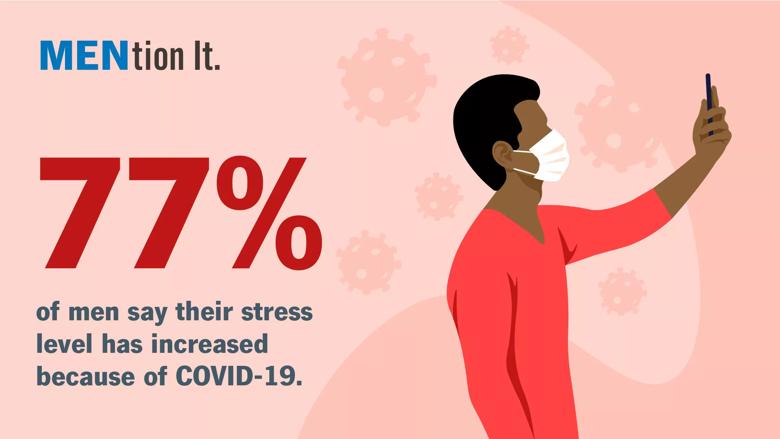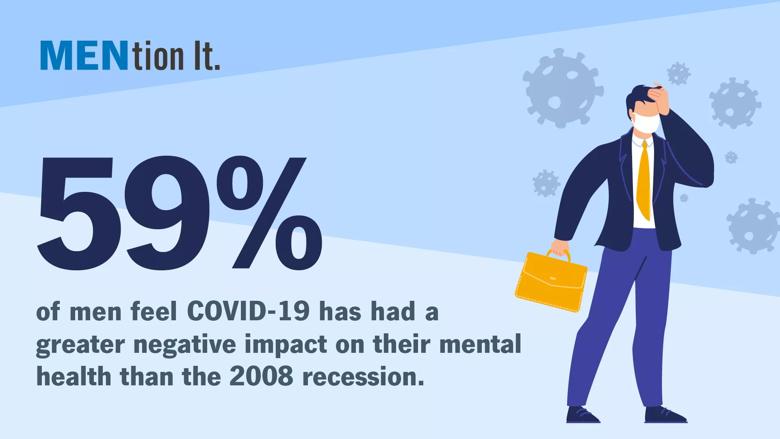National MENtion It® campaign examines how COVID-19 has affected men's outlook on health and how they are coping with all of the changes
Content is property of Cleveland Clinic and for news media use only.

A new national survey by Cleveland Clinic reveals that the COVID-19 pandemic is affecting both the mental and physical health of men and as a result, some men are negatively impacted while others are making healthier choices.
In an online survey among approximately 1,000 U.S. males 18 years or older, Cleveland Clinic found that 77 percent of men report their stress level has increased as a result of COVID-19, 59 percent of men have felt isolated during the pandemic and nearly half (45 percent) of men say their emotional/mental health has worsened during the pandemic.

Image content: This image is available to view online.
View image online (https://assets.clevelandclinic.org/transform/f71e4592-7a46-4553-8fce-b00d7f5bef26/20-HHB-1952795-Graphics-for-MENtion-It-221_jpg)
The survey was issued as part of Cleveland Clinic’s fifth annual educational campaign, “MENtion It®,” which aims to address the fact that men often do not “MENtion” health issues or take steps to prevent them. This year, Cleveland Clinic set out to see what sort of effect the pandemic has had on men over the past six months and what their outlook is looking forward.
“We couldn’t take the temperature on the state of men’s health this year without focusing on the one thing that has affected every person in this country and beyond,” said Eric Klein, M.D., chairman of Cleveland Clinic’s Glickman Urological & Kidney Institute. “Many men are finding themselves in new and different roles as a result of this pandemic; for example, they are out of work or are working around the clock at home looking after kids with their partners all while worrying about their family’s health and their own health. It’s no surprise that mental health rose to the top as a critical issue in this year’s survey.”

Image content: This image is available to view online.
View image online (https://assets.clevelandclinic.org/transform/51c0bafb-236f-4137-b10b-5bdc640af0c5/20-HHB-1952795-Graphics-for-MENtion-It-130_jpg)
Key survey findings:
“We want to remind men that their health shouldn’t take a back seat, especially during a pandemic,” said Dr. Klein. “If you’re experiencing symptoms that indicate a real health issue, don’t be afraid to come to the hospital or schedule an appointment with a healthcare provider, either virtually or in person. Your health is too important not to.”
Visit www.clevelandclinic.org/MENtionIt for more information about men’s health and important preventive steps every man can take.
Young Dad Recognizes Symptoms, Wins Battle with Colorectal Cancer
Ben Simcox was just 28 years old when he underwent his first diagnostic colonoscopy in 2009. It was actually his sister’s idea. After experiencing some rectal bleeding, and subsequently being treated for colon polyps, Heather Finley insisted her brother, Ben, get screened for colorectal cancer. Ben was about 20 years younger than the recommended age most people undergo their first colonoscopy.

Image content: This image is available to view online.
View image online (https://assets.clevelandclinic.org/transform/1a96ec79-f2b2-4e7d-adcf-30ae4b2ec31a/Ben-and-family_cropped-tease-REVISED_jpg)
Street Artist With Brain Cancer Paints Picture of Hope With New Therapy
In September of 2019, Jon Sedor, a 32-year-old artist, began suffering from migraines. It wasn’t until he woke up, confused and disoriented, in the emergency room at a local hospital that Jon understood the magnitude of the problem. A CT scan revealed an enormous brain tumor. Jon was diagnosed with a form of a malignant brain cancer called glioblastoma. He relocated from St. Petersburg, Florida to Cleveland, Ohio, his hometown, for treatment at Cleveland Clinic. He underwent a craniotomy along with seven rounds of chemo and radiation treatments. Jon’s currently using a new therapy that delivers low-intensity electric current into his brain, to prevent the cancer cells from spreading.

Image content: This image is available to view online.
View image online (https://assets.clevelandclinic.org/transform/77a49d7a-893d-49d1-ab12-28000177ce93/CCC-1962009_09-01-20_011_jpg)
Cleveland Clinic Doctor Becomes Patient For Lifesaving Heart Transplant
On June 6, Dr. Rick Wilson completed a 70-mile bike ride that left him feeling more exhausted than usual. One week later he suffered a massive heart attack. It damaged 75% of his heart – an event many people typically don’t survive. Despite ECMO and an implanted temporary mechanical assist device, Rick needed a new heart. Because his lungs and kidneys were beginning to fail, doctors had a very short window of opportunity to intervene. A heart transplant would be his only hope.

Image content: This image is available to view online.
View image online (https://assets.clevelandclinic.org/transform/726f5d7d-d6b3-475c-bb43-a56815d2c241/Rick-tease_bike-pic-first_jpg)
College Basketball Coach Rebounds from COVID-19, Continues Fight with Fatigue

Image content: This image is available to view online.
View image online (https://assets.clevelandclinic.org/transform/feaafdc3-17da-4549-aa01-bc7a2065daf1/Chris-Kielsmeier_Cleveland-State-WBB_1_jpg)
One day Chris is coaching the biggest game of Cleveland State’s women’s basketball season – the next he’s fighting COVID-19. Three months later, Chris still battles extreme fatigue. He remains incredibly thankful to the team of nurses and caregivers who worked tirelessly to restore his physical and mental health.
Methodology
Results of an online survey conducted among a national probability sample consisting of a weighted total of 1,180 American males 18 years of age and older, living in the continental United States. The total sample data is nationally representative regarding age, ethnicity, household income and educational attainment. The online survey was conducted by YouGov and completed between July 31st- August 3rd, 2020. The margin of error (MOE) for the total sample at the 95% confidence level is +/- 2.91 percentage points.
Cleveland Clinic is a nonprofit multispecialty academic medical center that integrates clinical and hospital care with research and education. Located in Cleveland, Ohio, it was founded in 1921 by four renowned physicians with a vision of providing outstanding patient care based upon the principles of cooperation, compassion and innovation. Cleveland Clinic has pioneered many medical breakthroughs, including coronary artery bypass surgery and the first face transplant in the United States. Cleveland Clinic is consistently recognized in the U.S. and throughout the world for its expertise and care. Among Cleveland Clinic’s 82,600 employees worldwide are more than 5,786 salaried physicians and researchers, and 20,700 registered nurses and advanced practice providers, representing 140 medical specialties and subspecialties. Cleveland Clinic is a 6,728-bed health system that includes a 173-acre main campus near downtown Cleveland, 23 hospitals, 280 outpatient facilities, including locations in northeast Ohio; Florida; Las Vegas, Nevada; Toronto, Canada; Abu Dhabi, UAE; and London, England. In 2024, there were 15.7 million outpatient encounters, 333,000 hospital admissions and observations, and 320,000 surgeries and procedures throughout Cleveland Clinic’s health system. Patients came for treatment from every state and 112 countries. Visit us at clevelandclinic.org. Follow us at x.com/CleClinicNews. News and resources are available at newsroom.clevelandclinic.org.
Editor’s Note: Cleveland Clinic News Service is available to provide broadcast-quality interviews and B-roll upon request.